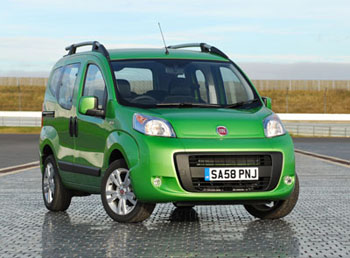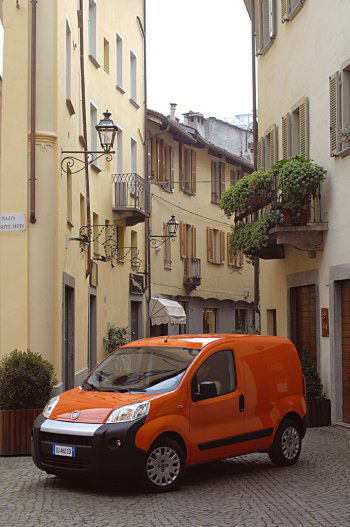
 |
|
Czech power company ČEZ company today
announced its intention
to support the development of electro-mobility in the
country and it will begin pilot trials by
lending 10 Fiat Fiorino vehicles in Qubo
(top) and Cargo (bottom) formats to
non-profit organisations. |
|
|
|
Czech power company ČEZ company today
announced its intention
to support the development of electro-mobility in the
country and it will begin pilot trials by
lending 10 Fiat Fiorino vehicles in Qubo and
Cargo formats to non-profit organisations. As
one of the first European power companies the pilot project
will including the development of
infrastructure necessary for the wider utilisation of
electric-powered vehicles. Lending the
electric-powered vehicles to non-profit
organisations in the Czech Republic will be a
key part of the
pilot project.
According to the recently announced FutureMotion strategy
the ČEZ Group has decided to support the concept of electro-mobility. Actions that the ČEZ Group takes in this
area are related to support of utilisation of
electric-powered vehicles, providing complex services with
relation to the ČEZ distribution grid and also further
support to production of electric power from renewable
sources. The target is to contribute to development of fully
“emission free” traffic in the Czech Republic.
"The electro-mobility concept has been a big challenge
for the ČEZ Group. Electric power seems to be a long-term
and perspective solution of traffic issues. Electric power
producers and distributors are logically partners to the
whole concept. ČEZ believes that electro-mobility shall
be one of the key directions in which power industry will
proceed in future and therefore it would like to be already
deeply involved in its development in the Czech Republic and
Central Europe," said Martin Roman, the General
Director and Chairman of the Board of Directors of ČEZ. In
his opinion the electro-mobility concept will help secure a
long-term stability and perspective to the ČEZ company and
to Czech power industry, it will contribute to better and
safe life of people, it will be a benefit for environment
and at the same time it will support the orientation of the
Czech Republic towards knowledge economics and the
competitive advantage of the Czech Republic within
international competition will increase herewith.
Improvement of environment and a good quality of life are
part of the municipal policy of many large regions and
cities therefore their authorities are involved in
development of electro-mobility both in form of direct
financial cooperation or for example by preferring
electric-powered vehicles (parking, access to city centre
etc.). The capital city of Prague is interested in the
electro-mobility project. “Future development of
municipalities will not do without radical changes in the
field of traffic, both urban and passenger. One of the ways
how to partially eliminate traffic impacts on quality of
life in municipalities is looking for new solutions in the
area of using electric power instead of combustion engines,“
says Pavel Bém, the Mayor of Prague. Potential users of
electric-powered vehicles in Prague could be for example the
Prague City Hall, further the Municipal Police of Prague,
the Museum of the capital city of Prague, the Prague City
Gallery, the Municipal Library of Prague, the Prague Public
Transit Company, the Prague Information Service, Prague ZOO,
the Prague Rescue Service, the Technical Administration
Service of Roads etc.
Electric-powered
vehicles offer many benefits. To begin with they do not
produce any emissions of toxic gases (CO2,
NOx etc.). Total CO2 emissions (including
emissions from production of electric power) vary according
to the way of production: using renewable sources or nucleus
they are about 0.25 grams per kilometre, the current power
mix of the ČEZ Group generates 95 g/km. Common fuel
vehicle emits 164 grams of CO2 per kilometre. Other
significant advantage of electric-powered vehicles is their
minimal noise level and much smaller maintenance demands. In
terms of a user the electric-powered vehicle fuel costs
converted to kilometres are already cheaper than at a common
combustion engine car. Overall costs for operation of
electric-powered vehicles are comparable to common cars and
their significant reduction can be expected in future.
ČEZ electro-mobility
The Electro-mobility project of the ČEZ Group has three
stages. In the initial stage of the pilot project ČEZ is
going to put into service minimally 10 electric-powered
vehicles by mid 2010 in form of free rent to selected
non-profit organisations. The Prague Sue Ryder Home will be provided a model of the Fiorino
Qubo passenger car and the Fiorino Cargo van as the first.
Electric-powered vehicles operation data (consumption,
charging experience etc.) will be monitored and ČEZ will use
this knowledge in further stages of the project. Advanced stage of the pilot project will be implemented
by 2012. It considers purchase of 50 to 100 electric-powered
vehicles and its objective will be to test the charging
infrastructure in Prague and Ostrava simulating a real
long-term operation. In this stage ČEZ already expects a
proactive involvement of municipalities, especially by
building public charging stations. At the same time there
will be held a meeting with potential strategic partners –
leading automobile manufacturers – themed development of
common long-term project. The ČEZ Group will invest
approximately half a billion Czech Crowns in the pilot
project. The experience from the pilot stages in partnership
with manufacturers of electric-powered vehicles will the ČEZ
Group use in long-term plans to profile as a provider of
electro-mobility services (third stage).
Electro-mobility in Europe
The inefficient combustion engine has been still
dominating to traffic. Although ecological parameters of
engines improve, the local pollution and noise have still
been a live problem. In effort to improve environment and
life in cities many European and world cities and regions
promote wider application of electric-powered vehicles in
traffic. Key players in the electro-mobility concept are
manufacturers of batteries, electric-powered vehicles,
users, cities and state (providing benefits to development
of electric-powered vehicles) and distributors of electric
power. Some large European power companies have already been
supporting such projects and investing money in the first
infrastructure concepts in West European cities (for example
in Berlin). It is a very interesting business opportunity
for them. It includes development of an infrastructure
necessary for electric-powered vehicles, supplies of
electric power to end customers, billing and additional
services. Experts deem that customers – future users of
electric-powered vehicles – can be attracted only by a
widely conceived, safe, accessible and available
infrastructure. The main technical problem at electric-powered vehicles
seems to be batteries, especially their not fully sufficient
capacity which even decreases when used. It is necessary to
increase the driving distance of vehicles and speed of
charging the vehicle – both are solvable problems. It has
already been worked on development of batteries with higher
capacity and life durability; technologies for fast charging
already exist.
|